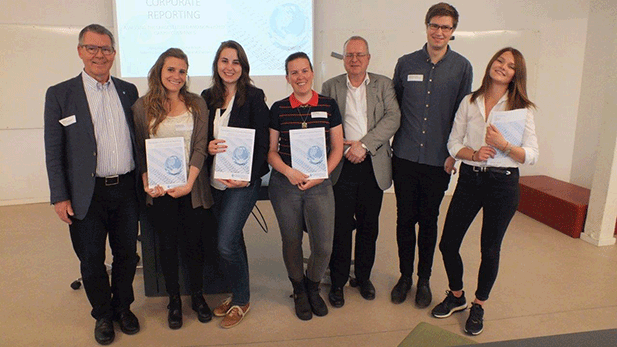CBS students scrutinize anticorruption in Danish firms

Anti-corruption report presented earlier this week. From left: TI DK chair Knut Gotfredsen; students Alexandra Kemp (Chile), Rebecca Schmid (Schweitz) and Sophie Ferdinand Ellgaard (Danmark); CBS advisor and Associate Professor Stig Hartmann; TI DK project assistant Asbjørn Malte Jacobsen; student Marina Trocin (Moldova). Photo: Transparency International Danmark
Should CEOs and employees participate in anti-corruption training programmes? And does the firm have publicly declared support to carry out anti-corruption efforts?
Four students at CBS asked 30 of Denmark’s largest firms 13 questions about corruption, publishing their findings in the report “Transparency in Corporate Reporting”, presented by the NGO Transparency International Denmark (TI DK) earlier this week. This is the second time the organisation has published a report on corruption in Denmark, with CBS students helping to make that possible both times, explains the chair of TI DK Knut Gotfredsen:
“Transparency International Denmark is located at CBS, and working with students is of interest for us. For example, with regard to receiving their academic input on our methods,” he says, adding that collaboration with the students also reduced the cost of producing the report.
Sophie Ferdinand Ellgaard is one of the four students from CBS who looked for answers to the 13 questions about anti-corruption on the firms’ websites. The firms were subsequently awarded points based on whether it was possible to find the answers. Arla Foods, Lego and Novo Nordisk, were on the list, which comprised 20 of the largest listed and ten of the largest unlisted companies in Denmark.
“Working with an NGO like TI DK is exciting because I’d like to work in the NGO world,” says Ellgaard, who is taking a double degree in International Business and Politics and is affiliated with the CBS-CEMS international graduate programme, where the anti-corruption project was carried out. She encourages other companies and organisations to collaborate with CBS to allow more students to have the opportunity to experience the world they would like to work in.
In comparison to the corresponding 2014 report, the firms communicate more clearly about their anti-corruption efforts. A new addition to the 2016 report is the fact that non-listed companies are included.
“On average, however, whether a company is listed or not does not appear to make a big difference. In the space of two years, we can see that companies write more on their websites, but we’re unable to determine if they actually do what they say they do,” explains Gotfredsen.
TI DK hopes to continue its positive collaboration with CBS-CEMS with an updated report again in 2018. Collaboration also takes place with CEM’s students in other countries, for example, the Netherlands, on anti-corruption reports.
![]() Read entire report
Read entire report